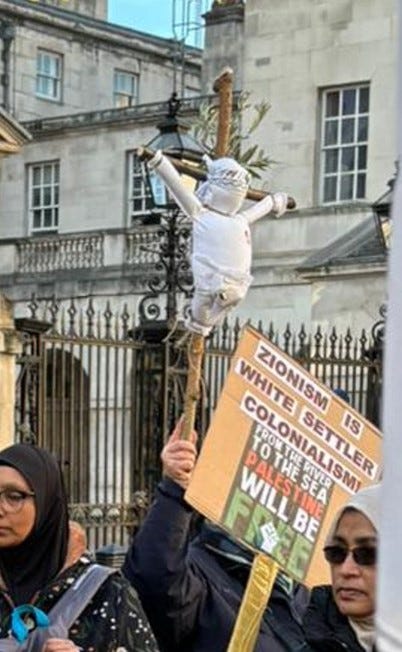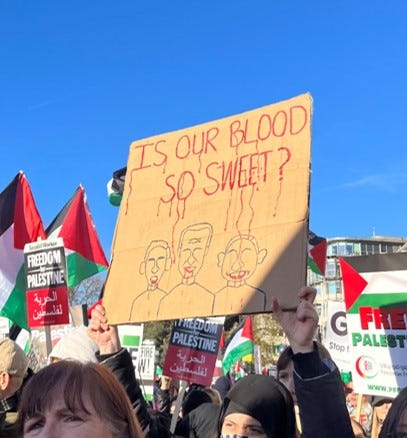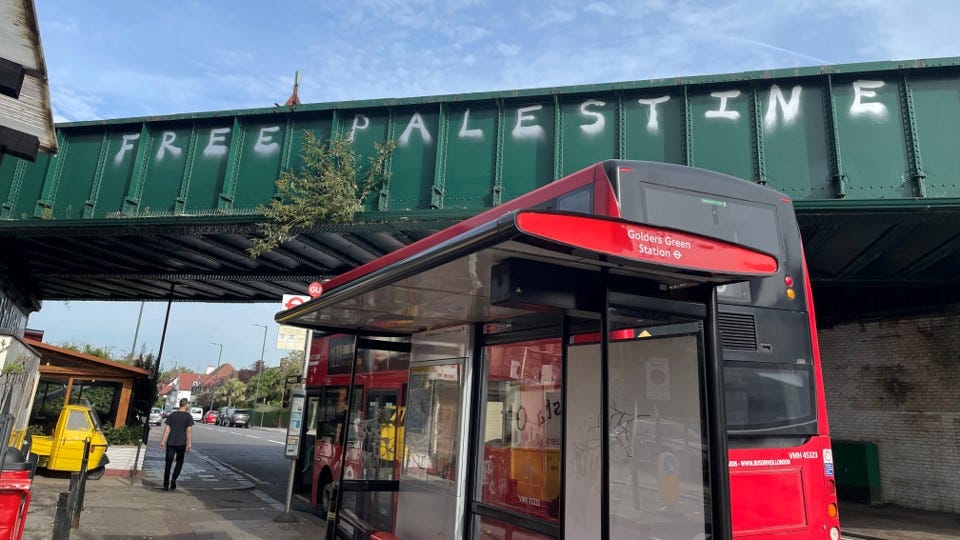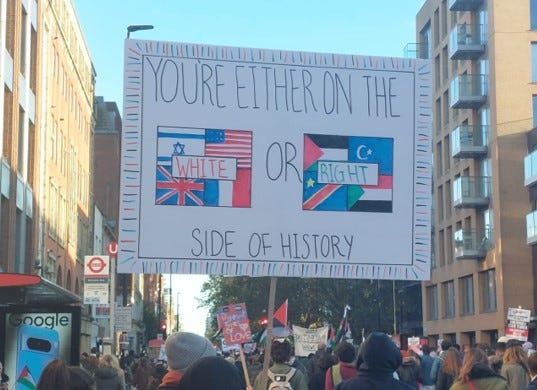It is a little over two months since Hamas stormed over, under and through the fence separating Israel and Gaza, slaughtering over 1,200 people and sparking a war that has so far cost over 18,000 lives and set off massive anti-Israel protests in Western cities accompanied by a wave of antisemitism around the world. Here are five things I think we have learned about antisemitism since that awful day. It is not an exhaustive list and much of it is still open to change. Nor is it an assessment of the conflict itself, but rather of how some people in the West, and especially in the United Kingdom, have reacted to it.
Antisemitism is a very light sleeper indeed
It is often said that antisemitism is a light sleeper lying just beneath the surface of society, ready to raise its head whenever the opportunity arises - and how the last two months have proven this. There have been arson attacks on synagogues in Germany, Tunisia and Armenia. In Canada there have been three different firebombings of Jewish buildings and shots fired at two Jewish yeshivot (religious schools). Terrorist plots targeting Jews and Israelis have been foiled by police in Germany, Cyprus and Brazil. Angry protestors have burnt Israeli flags in Spain and Sweden, not outside the Israeli embassies in those countries, but outside synagogues (in Malmo they chanted “Free Palestine, Bomb Israel”). In Vienna part of a Jewish cemetery was set alight and swastikas daubed on the walls. In Paris and Berlin multiple Jewish homes were marked with antisemitic graffiti. In Turin a man with a knife shouting “Allah Akbar” was stopped by police outside a synagogue. In the United States a man fired shots outside a synagogue and when he was arrested he declared “Free Palestine” to the police. Elsewhere in the US a woman drove her car into a school building, wrongly believing it to be a Jewish school (it belonged to the Black Hebrew Israelite sect, and the Star of David on the exterior wall made it a target). In Russia a mob stormed an airport looking for Jewish passengers to attack. Most tragically of all, Paul Kessler, a 69 year old Jewish man, died after being struck on the head by somebody on a pro-Palestinian demonstration in Los Angeles. (Police say there is no evidence that the murder of Samantha Woll, a synagogue president in Detroit, was a hate crime, but it remains unsolved.)
In Britain there has been graffiti on synagogues, Jewish schools, a Jewish cemetery and a Holocaust research library, alongside an unprecedented wave of verbal abuse and threats directed at Jewish people in the street. Thankfully the level of violence described in the paragraph above has not (yet) hit the UK, but that doesn’t mean it won’t. What has happened is bad enough: a record increase in anti-Jewish harassment. Antisemitic incidents recorded by the Community Security Trust since 7th October have exceeded the total for all of 2022. The police recorded 533 antisemitic hate crimes in London alone in October 2023, compared to just 39 in October 2022. It is as if for some people there is a belief, a sense of excitement even, that the conflict over there also belongs here. “The war is starting - free Palestine”, is what one antisemite shouted at a Jewish man walking in north London a day or two after the Hamas terror attack. “Jew-hatred” was trending on Twitter last week, and that sums up how it has felt for many Jews since 7th October.
It’s important to acknowledge just how abnormal this is. No other foreign conflict triggers waves of hate crime against British minority communities in the way that the Israel-Palestine conflict does (there has been an increase in anti-Muslim hate crime since 7th October as well, although not to the same degree). The only comparators would be the anti-Muslim hate crime seen after major terrorist attacks, or the anti-Chinese hate crime in the early part of the Covid-19 pandemic. Yet terrorism and Covid-19 are both things that people in Britain feared would affect them personally. The scale and intensity of the reaction to this conflict from people who have no personal connection to either Israel or Palestine suggests that something different is going on.
Anti-Zionism attracts antisemites. Duh!
It would be staggering if a global movement to condemn the world’s only Jewish state as a unique transgressor of all moral and human values didn’t attract people who dislike Jews. Helpfully, they are not shy of advertising who they are. We’ve had Zionists supposedly controlling the government and the media, the blood libel allegation that Jews consume the blood of children, Israeli leaders as devils, an Israeli snake wrapped around the globe, swastikas entwined with Stars of David, and, of course, the ubiquitous comparison of Israel with Nazi Germany. We’ve even had a Palestinian baby Jesus on a cross, juxtaposed with a placard declaring Zionism - the national movement of the Jewish people, don’t forget - to be “White Settler Colonialism”. You couldn’t get a more apposite image of the old and new forms of antisemitism entwined.
Where do people get these ideas? The answer lies somewhere between the social media apps on their smartphones and the anti-Jewish demonology of the Middle Ages. I don’t know whether the person who sat at home with a blank piece of cardboard and a marker pen pondering how best to visually express their support for the people of Gaza, and came up with “Is Our Blood So Sweet?”, knew that they were channelling the ritual murder blood libel charge that was first invented in Norwich in 1144, was inscribed into English literature via Geoffrey Chaucer’s Prioress’s Tale and Shylock’s pound of flesh, and made it all the way into the Nazi propaganda rag Der Sturmer - but that’s the lineage of this particular image.
My point is not that most people on these marches think this way, or made antisemitic placards, or anything like that. It’s obvious that many amongst the minority of people in Britain who hold antisemitic views are attracted to this movement and not enough is done to push them away, but that does not mean that everyone who wants a ceasefire endorses the blood libel. Rather, I’m interested in the fact that where antisemites are concerned, the old tunes are the best. They cannot escape the antisemitic ways of thinking that our world has developed over centuries, because these ideas, myths and stereotypes about Jews are so deeply embedded and yet so readily available. Whether the specific wording refers to Israel, Jews or Zionism, it’s the way of thinking, the tropes within the language, that are the giveaway.
The distinction between Jews and Israel has been profoundly blurred
This blurring has happened in both directions. The 7th October terror attack sent a shockwave around the Jewish world more profound than anything I can remember. People I know who usually wear their Jewish identity very lightly felt it as deeply as those who are fully invested in Jewish communal life. Journalists who rarely write about being Jewish - some of whom I didn’t even realise were Jewish - wrote moving, personal accounts. Josh Glancy named it Baddiel’s Fence: the perfectly reasonable, and until recently fairly common, diaspora Jewish identity that had rationalised away any need to think about Israel. And then the pogrom of 7th October smashed that fence to pieces and left only raw emotions in its place. Grasping this is essential to understanding why that day affected so many Jewish people in the way that it did.
This is because the collective memories and shared historic trauma that the Hamas pogrom awakened are Jewish, not Israeli. The pogroms, the expulsions, the systemic persecutions and the Holocaust itself all occurred before Israel existed. The whole point of Israel, the great promise of Zionism, was that massacres of defenceless Jews on such a scale would no longer be possible. And then it happened anyway. Hamas did not only take Israeli lives and hostages on 7th October; they violated the post-Holocaust Jewish effort to rebuild a stable and reliable sense of ourselves and our place in the world. Israel is often referred to as a lifeboat for Jews, a place they know they will always be welcome if they have to flee their home countries. “From a burning or sinking ship people jump no matter where – onto a lifeboat, a raft or a float”, Isaac Deutscher wrote in 1954. The Jewish response to the 7th October attack revealed that Israel is not just a potential lifeboat in a pragmatic sense, but has come to form a psychological buttress for global Jewish self-confidence. We need Israel more than we realised.
On the other side of this blurring stand those who have adopted “Free Palestine”, not as a slogan of liberation for Palestinians, but as a rhetorical weapon against Jews. I’m thinking of the people who daubed “Free Palestine” in huge letters on the railway bridges over the main roads in Golders Green on the night of 8th October. The people who wave Palestinian flags outside synagogues. The countless shouts of “Free Palestine” at people walking to synagogue, students on university campuses or Jewish children at school. The hundreds of “Free Palestine” comments under the “Happy Chanukah” social media posts of Premier League clubs and politicians last week.
To a certain extent this is not new. There have been waves of antisemitism during previous conflicts in Israel and Gaza, and language related to the conflict is usually prominent in those hate crimes. But this time it feels different, because “Free Palestine” specifically has become more common, more uniform and more formalised as a slogan of anti-Jewish abuse. It is something that antisemites know to shout at Jews to offend and frighten them (the left wing equivalent of “Heil Hitler”, in this specific usage), or, alternatively, a kneejerk reaction to the presence of Jewish people amongst people who really hate Israel. This bucks a trend amongst opponents of Israel who normally insist that Zionism and Israel have nothing to do with Jews, and therefore their anti-Zionism cannot be antisemitic (“We love Jews, it’s those f**king Nazi Zionists we hate”, a mosque leader in north east London assured me a few years ago). The consequence is a conflation of the central slogan of pro-Palestinian activism and the language of antisemitic harassment. It doesn’t do the Palestinian cause any favours, nor is it good for Jews, but that’s what is happening.
If you want to know more about antisemitism, my book ‘Everyday Hate’ is a guide to how antisemitism is built into our world - and what we can do about it https://www.bitebackpublishing.com/books/everyday-hate
Nobody agrees about anything
There has been a lot written about the denial circulating online about what Hamas did on 7th October. Every aspect has been challenged: whether anyone was raped or beheaded, whether babies were killed or ‘only’ children, if Israeli forces responding to the Hamas attack killed most of the Israelis who died, and so on. It is inevitable that some details from the initial coverage will turn out not to be true in the aftermath of such a chaotic day, but the broad outline of what Hamas did should not be in dispute any longer. The Hamas terror attack involved unimaginable barbarity, sexual violence and gleeful sadism. Anyone still questioning this surely has ulterior motives for doing so.
Beyond this denial of provable facts, though, there is a vast chasm in understanding about every word, slogan, image and intention on all sides. Take the word “Intifada”: for many Jews in Britain, it evokes the spectre of violence seen in the First Intifada from 1987 to 1993, which involved regular rioting with rocks and petrol bombs, or the more terroristic and lethal Second Intifada of the early 2000s, with its suicide bombings on buses and in cafes and restaurants. For many Jews, calls to “Globalize the Intifada” mean the kind of anti-Jewish violence and harassment that is actually going on around the world right now. But for others, it’s nothing more than a call for a peaceful uprising in support of Palestine, with no malicious intent. It’s hard to have any kind of dialogue when people are arguing from such fundamentally different starting points.
Or consider the vast ignorance that has been revealed about the basics of Jewish and Israeli history. It is taken for granted across much of the anti-Israel movement that Israeli Jews are wholly white people of European origin who moved to Palestine, either as emissaries of European colonialism or refugees from European antisemitism, and were warmly welcomed by the indigenous Arabs before slyly turning on their unsuspecting hosts. It shouldn’t need saying that this is a gross distortion of the actual history. Anti-Israel activists are hardly the first people to construct a false historical narrative to suit their current political needs, but this is an extreme version of the phenomenon. We have stopped telling the Jewish story, and left a vacuum that has been filled with untruths and misleading half-truths.
One aspect that is telling is that the entire history of Mizrahi Jews who lived in Arab lands for generations - thousands of years in some cases - does not feature at all; either the persecutions they experienced in those countries or their presence in Israeli society today. Whether this is down to genuine ignorance or political convenience is moot. There’s no reason for people to be familiar with the details of Jewish history, but that doesn’t tend to stop some from adjudicating the current conflict anyway. But it doesn’t help, to say the least. Protestors in London might feel reassured by a simplistic categorisation of Israel that fits their own identity politics, but it makes them irrelevant to any effort to find a solution to the conflict that has any connection to reality.
Anti-normalisation happens here too
But then, some people don’t want to find a constructive solution to the conflict that benefits both Israelis and Palestinians. In the UK, some of the people who oppose the idea of normal relations existing between Israel and its Arab neighbours also oppose any engagement with Israelis in Britain - and by extension, with any Jews who do not reject Israel. They fear the humanising impact of talking to people from the ‘other’ camp and campaign to undermine and obstruct any such initiatives. Just listen to the rapper Lowkey, speaking to a demonstration of schoolchildren on Whitehall last week, about - shock! - the British government funding programmes to promote dialogue between Israelis, Palestinians and their respective supporters in the UK.
That schools are the arena where this work is most necessary should be obvious. Where government and others seek to dial down the anger that is coursing around parts of British society right now, dividing communities and stoking record levels of hate crime, Lowkey, a patron of the Palestine Solidarity Campaign and the Stop The War Coalition, fears the “turning out this fire” that this involves. “We must defeat the normalisation push in the schools”, he says, because, well, if young British people meet real life Israelis (and Palestinians) in the flesh and hear their very real, very human, fears and hopes and experiences of life, they may develop a more rounded, less one-sided view of the conflict. This fear of normalisation with Israel also drives active opposition to interfaith work between British Muslims and British Jews. Some respond to conflict in Israel and Palestine by trying to bring affected communities together; others try to keep them apart. It should be obvious which option is better.









Underpinning this "no compromise with Israel" approach of the "anti-normalisors" seems to be a delusion that Israel's existence can be somehow "undone" or removed from the map. Perhaps this explains the obsession with blaming the West for Israel, a convenient fiction that "without Western Imperialism, Israel could be defeated." The cold, hard fact that this will never happen, that Israel is here to stay, Western support or not, and that any solution that helps Palestinians needs Israeli involvement and agreement, is thereby avoided by the "no surrender" voices of StopTheWar and others.
It won't influence the hard-core believers of course, but pointing out that the only alternatives to a two-state solution, however difficult, are either endless war or Palestinian defeat may work with the general Public to help marginalise the "from the river to the sea" crowd, by showing their complete political and intellectual bankruptcy. You can't eat what's not on the menu, most of us get that.
Also raising public awareness of the existence of the Mizrahi Jews and their history may help undermine this "White or Right side of History" rubbish.
Here's hoping, anyway.
Wonderful article David. Thank you for taking time to explain how deeply antisemitism is embedded in our culture.